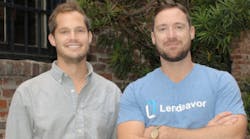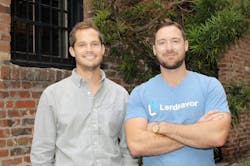How Lendeavor is disrupting dental and health-care lending: An interview with CEO Dan Titcomb and COO James Bachmeier
Above: Dan Titcomb and James Bachmeier
THERE'S A NEW PLAYER in the dental-lending space, but it's probably someone you've never heard of. In fact, it's guaranteed you've never seen one of their buildings. That's because San Francisco–based Lendeavor has no brick-and-mortar branches. Yet this digital lender—which can make major lending decisions in a mere 5–10 days—just signed a $120 million/year deal with First Internet Bank (FIB). When fulfilled, the five-year agreement would put Lendeavor in the same practice transition–lending pedigree as Wells Fargo and Bank of America.
I recently had the chance to interview Lendeavor's cofounders, CEO Dan Titcomb and COO James Bachmeier. We talked about the FIB deal, the company's groundbreaking software, why Lendeavor is able to offer such attractive interest rates, and how two high school friends from Minnesota wound up creating a technology-enabled lender in San Francisco. Here's what they had to say.
Interview with Levandor CEO Dan Titcomb and COO James Bachmeier
Kulsrud: Can you give me a high-level overview of Lendeavor and the origins of the First Internet Bank deal?
Titcomb: So, just a little background on us. Lendeavor is a technology-enabled lender to help health-care practices. Right now we serve dentists, veterinarians, and optometrists, but we will soon be branching out to other specialties.
Really, what we do as a lender is use technology to make the entire process of getting a loan more efficient. What that means is we've built software that allows the borrower to be more efficient and spend much less time in the lending process. The service providers who borrowers work with—the CPAs, brokers, equipment vendors—also spend less time in the process. Then, on our end, our processing team leverages our software to spend less time. Combine that with the fact that we're a digital organization—we have no branches or no sort of brick-and-mortar overhead like a bank would—and it all boils down to faster funding and lower rates.
That efficiency and digital delivery really made First Internet Bank an ideal partner for us. First Internet Bank is also a fully digital bank; they have no brick and mortar. What we've done is partner with them both from the loan purchase side and the equity side to build what we think can become up to—in the next 12–18 months—the third biggest player in the dental-lending and health-care practice lending space.
The deal is $120 million dollars per year for the next five years in committed loan-purchase agreements between Lendeavor and First Internet Bank. Additionally, our customers can leverage First Internet Bank's digital business services—remote capture, online banking, etc.—just to make their lives extremely easy. Plus, our customers can access all the other products and services that First Internet Bank offers.
The deal is a really good cultural fit. First Internet Bank was founded by David Becker, a former software entrepreneur. That's just like our team—we have a lot of software people as well. Dave founded a number of software companies before he opened First Internet Bank in the late 90s. First Internet Bank's culture is really nimble, really entrepreneurial, really software focused, and very focused on the customer experience, just like ours.
Kulsrud: How did you and First Internet Bank meet?
Titcomb: First Internet has had an interest in dental lending. They have made some loans to practices and also purchased portfolios of active lenders. We were alerted to the interest they had for dental practice loans, along with their interest in practitioners. As a result of that notification, we reached out and began getting the deal done.
Kulsrud: In terms of your total business, what's your percentage of dental loans?
Bachmeier: Dental is about 85% of what we're doing. It's just a great, fragmented space when you compare it to what's happening in veterinarian and, in some instances, medical. It's also a very easy loan to understand. So, part of it has been that we like the loans a lot. That's been our primary focus to date. I think that the overall percentage of 85% is going to decrease a bit, not because of lack of interest or lack of growth. I just think we're going to have the bandwidth to increase our involvement in the other specialties.
Kulsrud: The dental space—and our audience—is made up of a diverse range of practitioners. They span multiple generations, have different needs for loans, and have different expectations about what a bank should be. They may not even know what a digital bank is. So, from your perspective, what kinds of loans are you looking for, and who do you see as your ideal dental clients?
Bachmeier: Your question touches on some of the broader trends we're seeing in dentistry, and it's a bit of a credit question as well. I’d address the credit question by saying that we lend to bank quality borrowers. We're looking for great loans. In some ways we're more aggressive than our primary competitors, but it’s for common-sense, great deals that—due to regulation or bank-bureaucracy—they're not doing. But for the most part, we're also looking for really good deals.
I think this question ties into the type of customer we're seeing, too. We like to work with everybody, from new to established dentists, but I think our product really appeals to new owners. We think this is an exciting time in dentistry because a lot of baby boomers held on to their practices during the recession. Not that the transition market ever really dried up, but it seems to be particularly strong right now. A lot of the people who are buying these practices are younger and expect more from the customer experience, and they expect some sort of involvement in technology.
This is a great place for us to be because we're the only lender in this space that's focused on technology. And we're the only technology-focused lender who's focused on health care. So, we think we're naturally a great fit for those new buyers who are 2–5 years out of school.
Trends in the dental industry
Kulsrud: One of the biggest concerns our audience has is about how the dental industry and dental practices are changing. I don't need to explain to you that dentists have been affected with DSOs coming into the marketplace and more small group practices popping up. I hear dentists wondering if they can survive as private practitioners in the next 25 years. Still, there are two ways to look at it, right? You can say the walls are closing in . . . or that this is an amazing time where things are changing and dentists have the chance to be entrepreneurs. You could point to the fact that there's still a huge number of people who don't have access to dental care or don't utilize the benefits they have, and maybe with the right business model dentists can find something that matches their lifestyle and financial goals. So, I'm curious to know, from your perspective, how you see the dental industry evolving. Obviously, you guys have to calculate risk. Where do you see risk right now in terms of ownership in the dental space?
Bachmeier: It's a really great question, and actually I had the pleasure of seeing Dr. Chris Salierno, your colleague, speak on this at the practice valuation study group meeting in San Francisco last year. I think he is far more of an expert and equipped to speak on this than I can, but I really agree with his conclusions. What we're seeing on the front lines is consistent. We see a growing number of multipractice owners in that 2–5 practice range. That owner is somebody who we really want to work with. They are very much underserved. I can tell you, we're excited about what's happening in the industry. We're aware that consolidation is something that's happening. (You're seeing some failures, by the way, in some of those large DSO groups.) We think the market will remain more fragmented, and for longer than some suggest. We're not seeing prices being driven up by corporate to nearly the degree of the veterinary industry, and I think there's a long-term opportunity for dentists to be successful multibusiness owners, and they don’t have to be over their heads in the 5–10 practice range that's proven to be so tough. Selfishly, as a lender, in the long haul we'd like to see the space remain fragmented.
Titcomb: We can also come at that question from this angle: What we're trying to build with our technology and our speed is almost an alternative for sellers, in the sense that a DSO can come along with immediate liquidity and an immediate sale. The more we can help brokers with a really fast turnaround product from a financing perspective, the more we can help them be competitive with the competing value proposition of a DSO. So, we actually think if we execute really well on our part and our product roadmap, we may be able to contribute to DSOs being curbed a little bit and empowering the small-practice owner.
Bachmeier: I hate to use an Uber example, but they like to say, "Hey, we weren't just replacing the cab market." Instead, it was sort of like cars replacing horses—it expanded the size of the market. I know in dentistry there's a certain number of dentists coming in every year. Where I think the analogy could hold true is that utilizing technology and having a better experience could contribute to the space remaining more fragmented, just like Uber increased the size of the cab industry. In that example, it was much larger than simply replacing one thing for another.
Changing the lending timeline for dentists
Kulsrud: The technology you're introducing is enabling lending decisions to be made much faster. Dentists will be able to secure relatively quickly what they had to wait for in the past, and it may be the largest sum of money they ever borrow in their lives. So, in terms of pacing themselves, what questions should dentists be asking to make sure they are prepared to go forward with a loan? What do they need to do to make sure they are well prepared when they approach you? Do they need a team of experts, or do you have any of those in house? In other words, what honest questions should they be asking themselves?
Let me first talk about that and what it entails. The really cool thing about us is this: If anyone is thinking of becoming an owner, the first thing they can do is go to Lendeavor.com and click on the prequalification link for buying a practice. In 10 minutes (or less, actually), we can get everything we need to know to make a decision. We do a soft credit pull, which means there is no ding on your credit or harm to your score. In that process, we get some personal financial information and your production capability. We are able to take a look at your license to see if there are any issues there. And we confirm that you're either a permanent resident or a citizen. With that bit of information, we know everything we need to know about you as a buyer. Now, we're going to have to match you up with the right practice based on your production capability, but in 10 minutes we know what we need to make a prequalification decision.
I totally get it—people want to know, "Who should I talk to first?" But they should start there. And absolutely, they should get a team of advisors around them, whether it comes to looking for a practice or, when they find the right one, being sure they're being represented properly. They shouldn't be working by themselves when the seller has broker that's involved. They absolutely should be utilizing a team of advisors. We have great network here, too, so we can be very encouraging of that. But I think the first thing they should do is go to that prequalification page.
Here are some other guides: Don't freak out about your student loans. They're there. Everybody has them. Our lenders aren't going to not look at you because you have student loans. Focus more on putting some money in the bank, and prove yourself as a producer. If you're buying a practice, the biggest thing that any lender will look for, whether it's us or any one of our competitors, is whether you are capable of replacing the person leaving the practice. So really establish yourself on that front. Also, make sure you pay your bills and don't take out major credit card debt. Those are some really simple tips, and that's mostly what it comes down to. You'll see that it's those four or five pieces of data that we're focused on and what we need to know you as a buyer.
Now the question is, how does our process compare to the process at a "traditional" bank, and how much faster and efficient are we? The great thing about our process is it's designed to get these things that are really critical to know upfront, whereas at the bank sometimes you might get burned by a piece of information two months into your loan application. In fact, there's a practice broker that we've worked with a few times who was using a competitor, and the broker had a client who was not a permanent resident of the United States. Now, that's something we find out in five minutes. That fact would make it tough to do a loan, obviously. But in this case, the competing bank found this out during the closing process, and everybody was two-and-a-half months into the transaction. It killed the deal.
In 5–10 minutes, we find out all that critical information and get rid of all of those potential snags. When you have all the information we do, we do a credit call and within a day or two we have a formal decision. At a "traditional" bank, you're going to have a scattering of the application. You're going to be emailing stuff back and forth, and the processing time is going to take longer. Very often you're looking at two weeks for their underwriting decisions.
Building the company—and an idea
Kulsrud: Can you guys give me a bit of personal background about your business journey? Tell me how you guys came to the decision to begin the Lendeavor and really go after this thing.
Titcomb: Sure. Well, first of all, James and I were high school friends in Minnesota. We were kicking around ideas in the football locker room after we lost—after many games we lost.
Bachmeier: Yes, unfortunately that happened quite a bit . . . we needed something better than playing football.
Titcomb: We've been kicking around the idea of working together for a long time. I think it started to germinate when I was I was in New York working in private equity in lower middle-market private investing. James was finishing up law school. His background is also in commercial real estate. We became really interested in the problems that small businesses face trying to access responsible credit in an easy, online way. And we became really interested in the idea that you could use technology to improve that experience. We up and moved to San Francisco in order to start that company after really kicking the idea around for six months or so.
Once we started the company, we were again focused generally on small businesses. We pretty quickly became focused on health care. We realized that health care was a space that was largely served by banks, that banks are awful with technology and have no investment in it, and that banks don't really care about the customer experience. We said, "Hey, look. There's a really big opportunity for us to come in here and provide a great product that people want." Ever since, we kind of started focusing on the health-care vertical. And we've really seen a lot of success and a lot of growth. The culmination of that, or really more of a milestone for us, is this First Internet Bank deal.
Kulsrud: Talk a little bit about that. You're out in San Francisco. What excites you about the technology industry?
Titcomb: I think if you look at our industry, a lot of the lenders in the space are attacking problems, such as refinancing credit cards online, taking two pieces of information and making an instant decision, etc. Companies like Lending Club, Prosper, companies like SoFi—they're taking a simple transaction and then delivering online, which is awesome. Those are great examples in the space we're playing in.
For us, the difference we bring is that we're part of a wave of new lenders and finance companies that are creating really powerful solutions to complex problems. When you think about health-care practice lending, there are more parts—whether it be a startup, an acquisition, a project loan, or an expansion. These are much more complicated deals. A $2-million dollar loan might have 5–10 people working on the loan. You have four different guarantors. You've got a piece of real estate. You've got 10 pieces of equipment. Historically, these loans take a lot a lot of time. I think the cool thing that we're just sort of chipping away at is this: What technology will do is take those transactions that historically are very expensive—to borrowers, namely . . . the participants in the transaction, the buyers and sellers—and remove a ton of that cost. And we're starting to do it. We have a long way to go, but that's sort of what we're laser focused-on—removing costs and making life better for our users. That basic concept of just removing the cost, improving efficiency, and the benefits that has for business and for society . . . I think those are some of the most exciting things and sort of the basic tenets of technology innovation.
Kulsrud: How do you plan to get the word out about what you're doing?
Titcomb: We've been moving kind of behind the scenes. James heads up our sales and marketing functions, so he would probably be better suited talk about that.
Bachmeier: We've been very grassroots to this point. What our business model has been is showing our value to advisors and service providers in the industry who have a steady stream of dental clients and who are doing a great job for those clients. We've grown primarily through that.
The biggest thing is that it's a relatively small world. We've been doing a good job so far, and word spreads quickly among those folks. We mentioned the raise in equity, so we're going to have more money to put in various channels and up our marketing a bit. But to this point, it's really been building out our sales team a bit, getting advisors to know us, and doing a great job for our clients. And we've had tremendous results to this point.
Titcomb: The one other thing I would add to that, which just occurred to me, is one thing we did not really expect when we were rolling this product out to investors, to advisors, to service providers, and whatnot. The borrowers themselves have really strong word-of-mouth. We have like 35% of our deal flow just from borrowers telling their friends about how much better their experience was with us.
Bachmeier: It is a small world, so if you do a good job it's a great space for a small team to grow significant volume. That's not to say that going out to trade shows isn't valuable. We were at CDA South and CDA North. Now we have full national footprint and a few more bucks in the bank, so we'll be making our way to all the major national trade shows. I still think our presence will be strongest on West Coast and the Pacific Northwest. But we're going to be everywhere.
How the First Internet Bank deal changes the game
Kulsrud: Tell me a little bit more about number of employees you have and what the infusion of money into the space enables you to do.
Titcomb: It's allowed us to essentially double the size of our team. We're at about 17 right now, we should be at 35 within the next 3–6 months. And then there's just the size of the commitment. How we look at it, as an independent company, it's probably one of the largest single commitments made by a bank to a health-care practice lending company like ourselves, really ever, as far as we can tell. Combing through the history of dental financing we haven't been able to find anything bigger. And then finally, one of the big things from a sales perspective is that although our process has always been superior to our competitors, pricing has been marginally higher relative to market leaders. What this deal allows us to do along with First Internet Bank is kind of get in line on pricing. Now, if you look at the whole picture, we're funding deals with less effort from the borrower, offering faster turn times, and putting out the same rates as our competitors. And we think those rates can go down as we get more efficient. You start to think, "It's not why would you use Lendeavor, it's why would you ever not use Lendeavor?"
Kulsrud: How attractive are dental borrowers in small business lending? These are some of the most credit-worthy individuals, correct?
Titcomb: That's the one thing we've found that I'm sure you're familiar with. Just from our perspective, it's fascinating just how much lower-defaulting as a class these loans are—specifically dentists. You look at cumulative loss rates across a portfolio, and you're looking at between 20 and 50 basis points of loss on 10-year or 25-year loans. Compare that to other areas like restaurants or transportation, and the default rates are way higher.
Kulsrud: Is there anything else you want people to know that they don't already know?
Bachmeier: The one thing I would say is this: I think when some people see a technology company, there can sometimes be a perception that we're trying to make it impersonal and there isn't service that goes along with us. Anyone who applies for a loan with us will quickly find out that technology allows us to be more personal because we're not so bogged down trying to work through pages of PDFs we can't read because your handwriting was terrible or because there's a page missing. It actually allows us to spend more time on the important things with you. I always like to make it clear that there's great service behind Lendeavor.
Titcomb: This has been a really tough road. I'd say the highest hurdle we've had to overcome as a company was integrating with a company like First Internet Bank and getting to that level. It's really hard to overstate how hard it is for a startup company to get the level of commitment that we did, not only for the bank to sign off on it, but for the regulators to sign off on it . . . and other regulators to sign off on it, because they're regulated by about four different entities.
Bachmeier: On the sales side, we're competing with two of the biggest lenders in the world in Bank of America and Wells Fargo, and the really cool thing about the technology and the way we're approaching things is now that we offer the same rates, the process really matters to people. We built all this, and it was really hard. But the success is we see people choosing us over the largest two brands in the world, when our company has been around and we've been lending for about a year.
Editor's note: This interview has been edited for length and clarity
MORE FROM THIS AUTHOR
How fee-for-service dentistry is making a comeback: An interview with Dave Monahan of Kleer
Editor's note: This article first appeared in the Apex360 e-newsletter. Apex360 is a DentistryIQ partner publication for dental practitioners and members of the dental industry. Its goal is to provide timely dental information and present it in meaningful context, empowering those in the dental space to make better business decisions.
Subscribe to the Apex360 e-newsletter here.
Dental news and press releases may be sent to Apex360 editors at [email protected]">[email protected].
For the most current dental headlines, click here.
About the Author

Zachary Kulsrud
Zachary Kulsrud is the editorial director for Endeavor Business Media's dental group, publishers of Dental Economics, DentistryIQ, Perio-Implant Advisory, and RDH magazine.
Updated July 7, 2020







